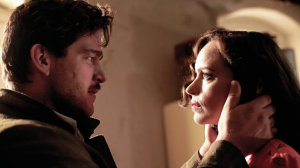THE LABYRINTH OF LIES, PHOENIX and VICTORIA.
The more evocative German title IM LABYRINTH DES SCHWEIGENS focuses on the silence after the war, most Germans chose or were forced to. In Guilio Ricciardrelli’s film a courageous young public prosecutor (Alexander Fehling) takes it upon himself to sue 8000 people that worked at the Auschwitz concentration camp. The year is 1962, when the Eichmann trial in Jerusalem had riveted the attention of Israel and Germany but the Auschwitz trials in Frankfurt, where Germans uncovered what their fellow countrymen did in the camps, were practically unknown. Nobody wanted to talk about it or know about it. Fifteen years after the war the name Auschwitz, according to the film, was unknown to lots of Germans. I remember that my father turned off our new TV when the trials came on, but I also remember seeing Alain Resnais’ film NIGHT AND FOG with my high school. We fifteen year-old students knew about Auschwitz. Ricciarelli’s film unveils a historically significant story that should be told again to the next generation who did not participate and don’t remember the Frankfurter trials – like most of my generation. Exploring heavy weight themes and complex moral issues the screenplay could have left out a few subplots (the Mengele story, the visit to Auschwitz, a few details about women in post-war Germany) but Alexander Fehling’s forceful performance as a driven, ambitious and inexperienced young prosecutor keeps us focused. THE LABYRINTH OF LIES is Germany’s bid for the 2016 Academy Awards — soon in the theaters.
PHOENIX by veteran filmmaker Christian Petzold is a very different look at post-war Germany and how the regular Germans handled the camps. The film has been described as a thriller (compared to VERTIGO but not quite as good), or as a contrived, unconvincing, unbelievable love story, or a spellbinding mystery of deception and illusion, tense, complex and drenched in atmosphere. I saw the film twice because friends of mine whose opinion I regard highly, came out of the theater with very critical comments about the irrational twists of the plot. After my second viewing I liked it even more and was not a bit bored by those twists and turns that indeed did not really make sense, but perhaps were not meant to make sense. Nina Hoss plays Nelly who survived the camps with a destroyed face but unfaltering love for her husband Johnny she is desperate to find in the ruins of Berlin. He is convinced that she is dead and does not even once think it is Nelly when she tracks him down. He sees a resemblance to his former wife who, as the only survivor of her family, is now rich. Johnny is after the money and needs the woman that looks like his former wife to help him get at least part of the money. Nelly does not reveal herself and plays along — why? Johnny acts as if he is blind, not admitting that this woman who is more and more like his former wife, is his Nelly – why not? Ronald Zehrfeld as Johnny does not look like the conniving type but rather like the big-eyed cuddly bear who would not squeeze money or anything else out of woman. After years of hiding her he divorced and denounced her when the war came to an end — a coward afraid of the Nazis. I thought Johnny slowly realized that the woman he is trying to turn into Nelly is indeed his former wife. But the coward pushes those thoughts away, he focuses on the money, not on the obvious. And Nina Hoss, in a powerful performance, emanates so much pain, love and sadness that you forget about her irrational actions. Watching her try to reconcile what can not be reconciled, is heartbreaking and thoroughly moving. If you keep asking why, said Petzold in an interview, you don’t like the film. (playing at Opera Plaza)
VICTORIA by Sebastian Schipper is a 140 minutes film in one take. No editor, no cuts, there were three takes to choose from, said Schipper in an interview. I thought of Sokurov’s RUSSIAN ARCH from several years ago, the 90 minute walk through Russian history in St. Petersburg’s Heremitage. A very different film, the only thing the two films have in common is the lack of an editor. VICTORIA is about a young Spanish woman experiencing a night in the city that starts out in a club and ends – 140 minutes later – when the sun rises in Kreuzberg. She meets a bunch of young men, one of them speaks a little English everybody else is fluent in “Berliner Schnauze”, very entertaining, very real. I saw it in a small theater in Berlin at Kottbusser Damm filled with those who live there and talk exactly that way. The audience was thrilled. But how can suspension be kept up for 140 minutes without cuts, without changing the scene, and characters — you have to add drama and action. So the 2nd part of the film turns into a thriller. The young men got entangled in a bank robbery and Victoria who had become attached to one of them went along all the way to the bitter end. The film was awarded top prizes at the Berlinale 2015 for best Cinematography, and at the German Film Awards for best cinematography, directing, and acting in the leading roles. Definitely something for the Guiness Book of World Records. (at the Roxie on Sept 27 as part of B&B’s fall preview)




